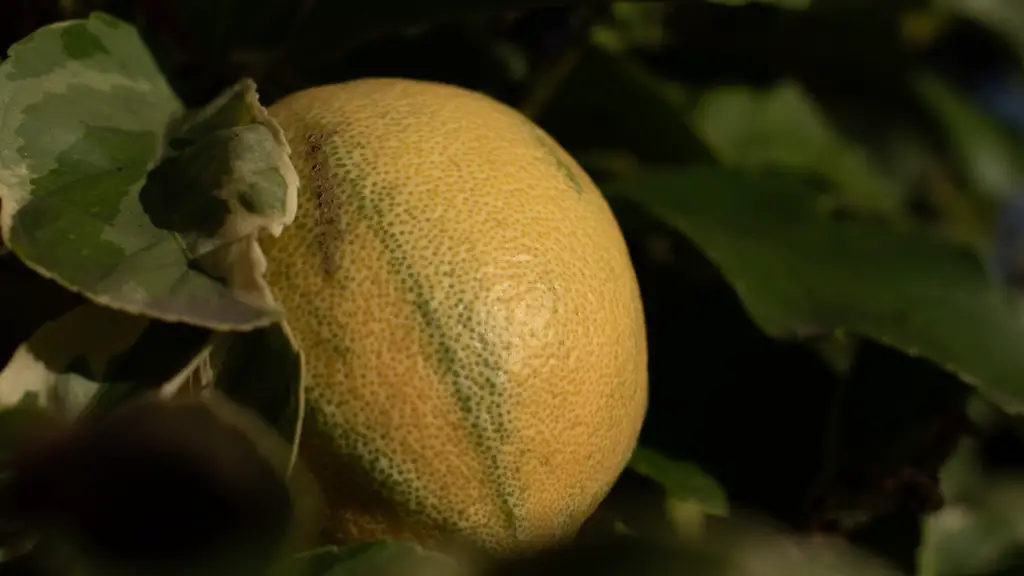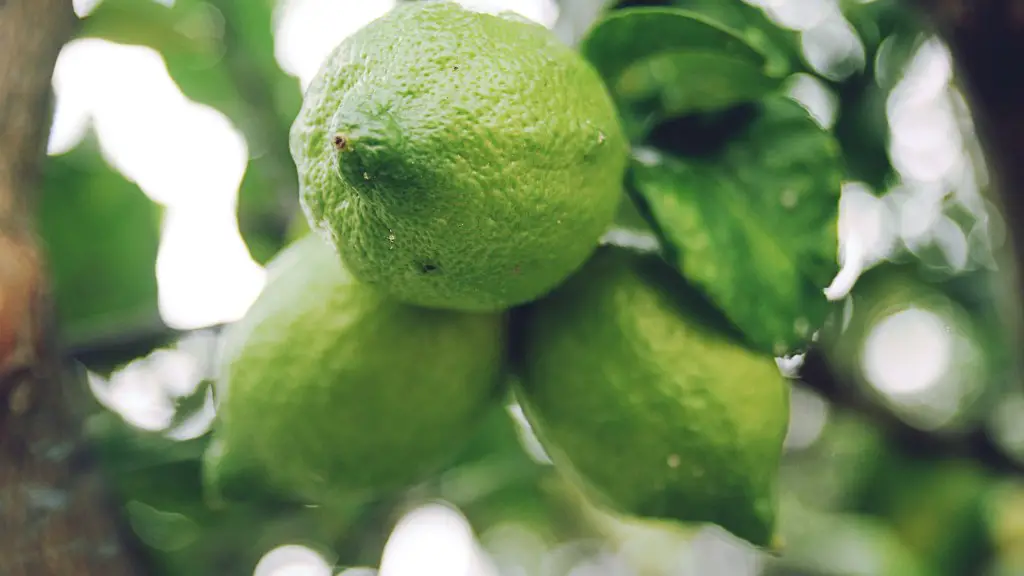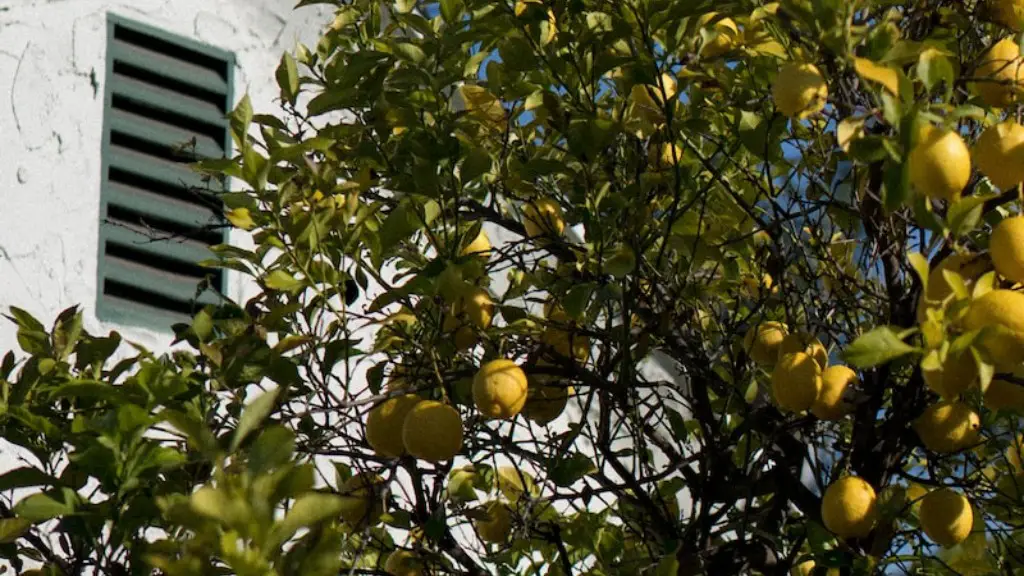Lemon trees are some of the most widely grown fruit trees in the world. They are adapted to a wide range of climatic conditions and can produce fruit all year round. For lemon trees to bear fruit, they must first reach maturity, which usually occurs around 3–7 years from planting. Generally, trees begin to bear fruit when they’re 3 to 5 years old, though this varies drastically with different varieties. Without proper care, lemon trees won’t produce or the fruit won’t taste good.
Due to their relatively long life span, lemon trees can live to be more than 100 years old. In most cases, however, they start to diminish in size and produce fruit less prolifically after the age of 20. Their lifespan can be extended significantly through proper pruning, fertilization, and pest control. After 20 years of age, it’s critical to provide proper maintenance in order to continue having large yields of high-quality fruit.
In order for a lemon tree to begin to bear fruit, there is a certain number of chill hours required for various varieties. The number of chill hours needed is the amount of time temperatures must remain below 45F, usually between November and February. Without the proper chill hours, a lemon tree will struggle to produce fruit, and yield lower-quality fruit if it does manage to produce at all.
A young lemon tree will generally have some blemishes (which are natural) due to its exposure to the elements. It’s also important to remember that an old lemon tree will typically produce much fewer fruit than a younger one. If you plan to keep an older lemon tree in your garden, you should consider removing any dead wood to open up more space for new fruit-producing wood.
When it comes to fertilizing, the most important step to ensure high yields is to fertilize during the spring and summer months when the tree is actively growing. This will help the tree produce fruits of higher quality. You can also apply fertilizer to the soil around the root zone of an established lemon tree. This will enable young plants to absorb more nutrients from the soil and will help the tree to produce larger fruits.
The last important step to ensure an old lemon tree bears fruit is to regularly water it. Regular watering during the dry season is essential if the tree is to thrive and produce a good harvest of lemons. Excessive watering is not necessary, but make sure that the soil is also moist. Generally, weekly watering is enough to sustain an old lemon tree.
In conclusion, old lemon trees can bear fruit but not without proper care and maintenance. This includes providing necessary chill hours, pruning dead wood, fertilizing the soil, and regular watering. All these steps must be taken carefully in order to produce high-quality fruit.
Pruning Old Lemon Trees
Regular pruning of an old lemon tree can help increase the amount of fruit it produces, as well as improve its overall health. Pruning helps keep the shape and structure of the tree in check, allowing for better air circulation and providing access to more sunlight. In addition, pruning helps reduce the number of pests and disease, which can negatively impact the yield. An old tree should be pruned annually to remove dead branches, crossing branches, and any growth that may be blocking sunlight from getting to the tree.
When pruning an old tree, it’s important to identify which branches are healthy and which need to be removed. This can help you selectively prune, as removing more than what is necessary can severely impact the tree’s capacity to produce fruit. Additionally, once all the dead wood is removed, hand-prune the healthy branches to help promote the growth of flowers and the ripening of fruits.
It’s also essential to monitor the tree during the pruning process to ensure that the tree is not affected negatively. If the branch size and shape of the tree drastically changes, or if some branches begin to look dead or unhealthy, then it’s time to stop pruning and seek professional help.
Old lemon trees that are properly pruned will not only produce a larger yield of fruit, but will also produce higher quality fruit. Pruning helps the tree to produce a more balanced crop that is less subject to pests, diseases, and damage from weather conditions.
Fertilizing Lemon Trees
Fertilizing is an essential step for ensuring that an old lemon tree will bear fruit for many years to come. Fertilizing helps to provide the essential nutrients that the tree needs to thrive and produce large yields of lemons. Nitrogen, phosphorous, and potassium are the three most important nutrients when it comes to lemon cultivation, and they should be applied in a balanced ratio.
For healthy growth and fruit production, it’s important to apply fertilizer regularly to your lemon tree, especially during the spring and summer months when the tree is actively growing. Additionally, it’s important to avoid over-fertilizing, as this can cause the tree to become weak and unhealthy. Generally, avoid fertilizing more than every four to six weeks during the growing season.
When selecting a fertilizer for a lemon tree, it’s important to look for one that contains high levels of nitrogen, as this will aid in the tree’s growth. In addition, select a fertilizer that contains secondary and micro-nutrients that the tree requires. Lastly, make sure to read the instructions carefully to avoid over-fertilizing or any other causes of damage.
Fertilizing an old lemon tree will help increase its productivity and ensure that it bears fruit for many years to come. Applying the right fertilizer can help the tree produce larger and more abundant lemons, as well as provide essential nutrients that the tree needs to thrive.
Regular Watering Lemon Trees
Watering an old lemon tree is essential for ensuring that it will produce large yields of healthy lemons. Without enough moisture, the tree will likely underperform and bear less fruit. Generally, lemon trees should be given adequate water during the dry season, depending on the environmental conditions of your area.
It’s important to note that too much water can be just as damaging as not enough. Too much water can cause root rot and other issues, including diseases such as powdery mildew. Therefore, it’s important to keep an eye on the watering needs of your lemon tree and make sure that it isn’t receiving too much or too little water.
When watering an old lemon tree, it’s important to give the tree a thorough soak every week or two, but avoid over-watering. If the soil is kept moist, it should be enough to keep the tree healthy and bearing fruit. Additionally, it’s important to note that the tree needs additional water when it is producing flowers or fruits, as the growing fruit requires more water than the tree’s leaves.
Regular watering of an old lemon tree is essential for its health and for ensuring a good harvest of lemons. The tree should be given enough water during the dry season, but avoid giving too much, as this can lead to root rot and other issues.
Protecting Lemon Trees from Pests and Diseases
An old lemon tree can be more susceptible to pests and diseases than a younger tree, making it important to take extra precautions when caring for it. Regularly inspect the tree for any signs of pests and diseases and take action immediately if any are found.
Pests such as citrus blossoms, red scale, and mealybugs can eat away at a tree’s foliage and fruit, while diseases like citrus canker, scab, and gummosis can damage the tree’s bark and roots. If any of these pests or diseases are found on an old lemon tree, proper treatment should be administered immediately.
In addition to inspecting the tree for signs of pests or diseases, the use of natural methods of pest and disease control can be beneficial. For instance, companion planting certain plants that emit strong odors and absorb excess moisture from the soil can help ward off pests, while certain beneficial insects like ladybugs help to reduce the population of certain plant-harming insects.
Finally, it’s important to use the least toxic and least damaging methods of pest and disease control when dealing with an old lemon tree. Any chemical treatments or pesticides should be used sparingly and only when absolutely necessary. Additionally, when using pesticides and fungicides, it’s essential to follow the instructions carefully to avoid damage to the tree.
Protecting an old lemon tree from pests and diseases is essential in order to ensure that it produces high yields of healthy lemons. Regular inspections, natural pest and disease control, and careful use of pesticides are all essential steps in protecting an old lemon tree.



